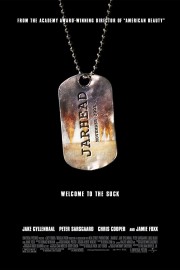Jarhead
Every major war seems to get their own brand of film. World War I films- rare as they are- deal with the Hell of war, as befitting the first major conflict that affected the world on a global scale. World War II films show the heroism and nobility of battle, and the outpouring of emotion for being able to come home again. (That Steven Spielberg combined this view with the ferocity of realistic combat violence in his definitive “Saving Private Ryan” only raises the emotional bar.) Vietnam films- as diverse as “Full Metal Jacket,” “Apocalypse Now,” and “Platoon” are- always seem to return to the theme of war’s emotional toll on the soldier.
In this tradition, the few non-documentary films about the first Gulf War that I’ve seen have been anything but traditional; like the Vietnam classics, diverse and intelligent filmmakers have found their own voice in portraying a common theme- the ambiguity of war, both what happens during it and why we fought. Think about it, Edward Zwick’s complex and engrossing “Courage Under Fire” takes a “Rashomon”-like approach to one man’s search for the truth about a female soldier’s death, and yet somehow brings closure to his own story in the Gulf. And then there’s David O. Russell’s irreverent and potent “Three Kings,” which looks at four soldier’s hunt for Iraqi gold after the war is over, and asks risky questions of American responsibility after the bombs were silenced.
Now look at “Jarhead,” based on the memoirs of Marine sniper Anthony Swofford, which were published in 2003 just as the current quagmire in Iraq was revving up. This looks at Gulf War ’91 ambiguity from the level of the ground soldier in the Gulf for months before they’re called into action; even then, they may not even get to fire a shot. (The ground war only lasted four days.) Adapted by William Broyles Jr. (an ex-Marine who also scripted “Apollo 13”), “Jarhead”- using get-in-his-head narration from Swofford’s book to show the main characters change of view from beginning to end (it doesn’t work as well as in “Apocalypse Now”; it is better than “The Thin Red Line”)- sometimes falls into preachiness about what good- or lack thereof- war has. That drags the film down more than the fact that this 2-hour war drama devotes about 90 minutes of that time to Swofford’s experiences in boot camp (just try not thinking about “Full Metal Jacket”) and the months of waiting and goofing off he spent in the desert. If that sounds boring, you haven’t seen what Oscar-winner Sam Mendes (“American Beauty,” “Road to Perdition”) have in store for his great cast. You can feel the desert heat beating down in every frame of Roger Deakins’ cinematography, and the emotional toll of the waiting game in every note of Thomas Newman’s evocative- and sparse- score.
The craftsmanship of Mendes, Broyles, Deakins, Newman, and the other behind-the-scenes artists wouldn’t be worth anything, though, if it weren’t for the talented cast in front of the camera, and their ability to make us care about the characters. Three “Jarheads”- all new to the genre- standout in particular; not surprising since it’s the three main actors. Jamie Foxx proves that Oscar for “Ray” wasn’t a fluke as Sgt. Sykes, a lifer and Swofford’s unit officer who explains to him- in an eloquent and honest speech- what makes a career soldier, and why this life may not be for Swofford. It’s a performance worthy of further Oscar notice, but this is already a strong Supporting Actor category, sure to get stronger in December. Foxx’s costar here- Peter Sarsgaard (one of the busiest and most reliable character actors in the business right now)- makes it even more crowded as Troy, a grunt new to “the suck” and eager to get right into it as a sniper spotter. The secrets his character carries sting when they’re unmasked, and his pent-up rage is palpable in a performance of unexpected depth and weight. His character’s fate resonates long after the credits roll and speaks deeper about the despair that can haunt a man who’s gone through what Troy has better than any words could.
Foxx and Sarsgaard are scenery, though; our focus is intended for Swofford himself. Jake Gyllenhaal earns our attention. A fearless actor (is there any riskier role now than as a gay cowboy in Ang Lee’s upcoming “Brokeback Mountain?”) whose star has been on the rise since 2001’s “Donnie Darko” (a compelling but overrated cult hit in my opinion), Gyllenhaal shows the gradual fear creeping into Swofford’s eyes as combat gets closer. Fear of not being able to perform in duty. Fear of death. Fear of losing his girl back home (a common fear- and happening- we learn with the men). Fear of maybe even losing himself. As much as he jokes around while playing football or skipping out on his responsibilities on Christmas Eve to horse around, there are moments we are allowed to see Swofford at his most vulnerable that Gyllenhaal- whose never been better- pulls off with effortless skill. It’s rare to see a true star-in-the-making nowadays (most who get the attention don’t survive when the actual films they’re in are released). After “Jarhead,” Gyllenhaal looks like the real deal. Expect to see him around for a long time.










